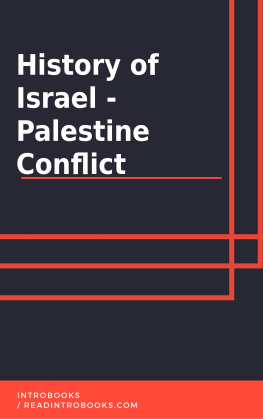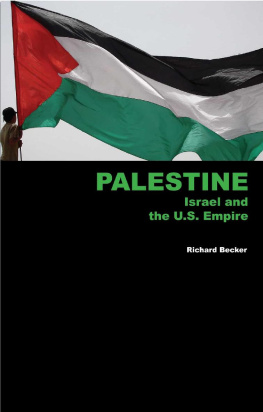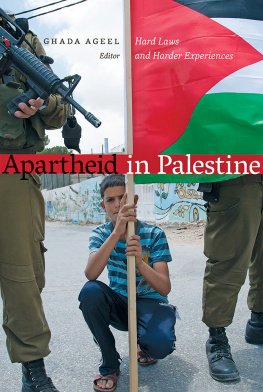ISRAEL, PALESTINE AND THE POLITICS OF RACE
ISRAEL, PALESTINE AND THE POLITICS OF RACE
Exploring Identity and Power in a Global Context
Yasmeen Abu-Laban and Abigail B. Bakan

The completion of this volume would not have been possible without the support and services of multiple institutions and individuals. Funding for this research and the publication of its findings were made available through the Social Sciences and Humanities Research Council of Canada, Queens University, the University of Alberta (including the Office of the Vice-President, Research), and the University of Toronto. Thanks are owed to our publisher, I.B. Tauris/Bloomsbury; the anonymous reviewers of the original manuscript; and to our editor, Joanna Godfrey.
We have been supported in the completion of this research by: the Department of Political Studies and the Department of Gender Studies at Queens University; the Department of Political Science at the University of Alberta; and the Department of Social Justice Education, Ontario Institute for Studies in Education (OISE), at the University of Toronto. We are grateful for the expertise and generosity of Kathryn Arbuckle and Amanda Wakaruk and other staff of The University of Alberta Library Systems, and to the staff at the United Nations Archives and Dag Hammerskjold Library in New York. The outstanding support of our copyeditor and all-round professional wordsmith, Angela Pietrobon, has been pivotal to the successful completion of this volume.
We are grateful to a superb group of graduate research assistants, who are also our colleagues: Katrina Bland, Kyle Jackson, Rusa Jeremic, Emrah Keskin, Nicole Lugosi, Elizabeth Macve, John McCoy, Nisha Nath, Elim Ng, Maria Relucio, Celia Romulus, and Siavash Saffari.
We are immeasurably grateful to many people who contributed to providing intellectual spaces for the conversations that surrounded the preparation of this book: Nahla Abdo, Ghada Ageel, Sharryn Aiken, Emily Andrew, Bruce Baum, Aziz Choudry, Roland Sintos Coloma, George Sefa Dei, Chandni Desai, Susan Drummond, Enakshi Dua, Dan Freeman-Maloy, Judy Garber, Joyce Green, Adam Hanieh, Paul Kellogg, Catherine Kellogg, Andy Knight, Kiera Ladner, Margaret Little, David Lyon, Mojtaba Mahdavi, Mazen Masri, Charles Mills, Scott Morgensen, Ester Reiter, Mary Jo Nadeau, Diana Ralph, Shereen Razack, John Riddell, Alan Sears, Sid Shniad, Daiva Stasiulis, Vannina Sztainbok, Rick Szostak, Njoki Wane, Suzanne Weiss, Cynthia Wright, Rafeef Ziadah, and Elia Zureik.
Parts of this book build on arguments that were previously published by the authors, jointly and equally. builds on Abigail B. Bakan and Yasmeen Abu-Laban, Palestinian Resistance and International Solidarity: The BDS Campaign, Race and Class 51, 1 (2009): 2954.
Our families have endured countless hours of distractions and have been endlessly supportive. It is an understatement to extend our gratitude, appreciation, and love to Paul Kellogg, Rachel Kellogg, Michael Stephens, Gabriel Stephens, Adam McNally, and Christine Tardif; Zachary Jericho Couture; Baha, Riyad, and Max Abu-Laban; and to Carol Shaben and Sharon McIrvin Abu-Laban.
The courage and tireless commitment to overcome the violences that are inherent in the Israel/Palestine racial contractin the region, in the diaspora, and in the global movements for solidarityhave been our steady inspiration. We hope this volume can serve to give back in some modest way. With all this support, the analysis presented in the following pages and any errors associated with this analysis are ours alone.
9/11 | September 11, 2001, the date of four air-based attacks against the United States |
AFN | Assembly of First Nations |
ANC | African National Congress |
APSA | American Political Science Association |
BDS movement | boycott, divestment and sanctions movement |
BNC | BDS National Committee |
CAIA | Coalition Against Israeli Apartheid |
CJC | Canadian Jewish Congress |
CPCCA | Canadian Parliamentary Coalition to Combat Antisemitism |
CPSA | Canadian Political Science Association |
GUPW | General Union of Palestinian Women |
ICCA | Interparliamentary Coalition for Combating Anti-Semitism |
ICJ | International Court of Justice |
IJV | Independent Jewish Voices (Canada) |
I/P racial contract | Israel/Palestine racial contract |
IR | international relations |
I/P | Israel/Palestine |
OPT | Occupied Palestinian Territories |
PLO | Palestine Liberation Organization |
PA | Palestinian Authority |
UN | United Nations |
US | United States of America |
WCAR | UN World Conference Against Racism, Racial Discrmination, Xenophobia and Related Intolerance; also called Durban conference |
In 2014, then Prime Minister Stephen Harper became the first Canadian head of government to speak in the Israeli parliament, the Knesset. He used the occasion to signal Canadas support for Israel as a specifically Jewish state and to criticize Canadian university campuses as places where most disgracefully of all, some openly call Israel an apartheid state (Harper 2014). Harper (2014) said it reflected outright malice because the country was based on freedom, democracy and the rule of law. As scholars based in Canadian universities who are fully versed in campus debates concerning Israel and Palestine, we knew that the prime minister was not in fact fairly representing the diversity of views expressed by the Canadian public on the political entity frequently termed Israel/Palestine in an effort to capture its complexity. Nor was the prime minister of Canada fairly representing the professors, students, and staff from universities and colleges across Canada who have participated in events aimed at challenging the human rights consequences of Israels policies, through what has become, since 2005, an annual educational event called Israeli Apartheid Week. And, as those who identify with both the Palestinian (Yasmeen Abu-Laban) and the Jewish (Abigail Bakan) cultural and diasporic experiences, upon Harpers speech in the Knesset, we were reminded of the importance of the work we were conducting, which has culminated in this book.
The Harper moment in the Knesset was not exceptional, however. Rather, a highly charged Canadian and international political atmosphere surrounding Israel/Palestine has been characteristic of our initial and continued scholarly work in this specific field. Such an atmosphere draws attention to the foundational and continued exceptionality of the idea of Israel in contemporary political discourse, and to the related exclusion of the political realities that have transformed the Palestinian people into stateless refugees, second-class Israeli citizens, and the occupied. Not least, in July 2018, the Israeli government approvedby a vote in the Knesset of 62 in favor, 55 opposed, and 2 abstentionsthe Basic Law: IsraelThe Nation State of the Jewish People. The law enshrines the Land of Israel as the historical homeland of the Jewish people, thereby unambiguously excluding the one in five citizens who are Indigenous Palestinians from membership in the nation. It also declares Jerusalem as the capital of Israel, universalizes Jewish immigration, and upholds the development of settlements as a national value (Basic Law 2018; Wootliff 2018).
Next page






